Plumbing and heating, ventilation, and air conditioning (HVAC) contractors have unique challenges when it comes to marketing. You’re working in hidden spaces, and potential clients usually don’t know much about you until something goes wrong. Even then, your work is often invisible, with the only evidence being a bill or the lack of one. In Read more
HVAC

Plumbing and heating, ventilation, and air conditioning (HVAC) contractors have unique challenges when it comes to marketing. You’re working in hidden spaces, and potential clients usually don’t know much about you until something goes wrong.
Even then, your work is often invisible, with the only evidence being a bill or the lack of one. In other words, this isn’t exactly a field where word-of-mouth works as well as it does for hotels or restaurants.
So what can you do to grow your business?
The answer lies in digital marketing strategies that will get you more leads, clients, and sales in today’s connected world. But, the trick is knowing which tactics are worth your time and which aren’t.
In this article, we’ll give you some essential digital marketing tips for plumbing and HVAC contractors so that you know how to market yourself effectively online. If you’re ready to dive in, read on!

#1. Go Social
With more than 4.6 billion users worldwide, social media platforms are an ideal place to boost your online presence and gain more eyeballs. That said, social media marketing can be tricky, but it can also be extremely effective. You have to be careful not to fall into the trap of posting to your social channels just to publish something.
You should be using social media to engage with your audience and build relationships with people who might need your services. Use the right social media channels for your business. If your industry is visual, Instagram, TikTok, and Pinterest might be a better fit than Facebook.
If you’re an HVAC contractor, Facebook and Instagram are great places to start. If you’re a plumbing contractor, you might want to try a combination of Facebook, Instagram, and Twitter.
#2. HVAC Contractors: Start With Lead Generation
The best way to generate leads for your business is to offer something for free. Whatever your industry, there are likely organizations that could use your services but don’t have the money to pay for them. You can help these organizations by offering your services for free, and in exchange, they’ll give you something: their contact information.
This type of marketing is called lead generation, and it’s a great way to attract new clients and grow your business without spending any money. There are organizations that could use your services just about everywhere.
Start by thinking about your local community and the places you spend time: your kids’ school, your church, your gym, your sporting events, and more. Throughout the year, these places celebrate birthdays, host fundraisers, and hold other events. You can offer your services for free, and in exchange, you’ll get the contact information of everyone involved.
#3. Invest in An Engaging Content Marketing Strategy
You might not be a content marketing pro, but chances are that you have something to say. And if you want people to pay attention to you, you need to say it in a way that’s easy to find, read, and share.
Most businesses should have an editorial calendar, which is a schedule for publishing content. Your calendar should include topics that are relevant to your industry, your clients, and your business.
Organize your calendar by topic and make sure to include content for all of your marketing channels. If you’re an HVAC contractor, for example, you might create a blog post about how to choose the right type of air filter, publish a how-to on installing solar panels, or create a HVAC salary guide to help HVAC business owners hire top talent.
Or, if you’re a plumbing contractor, you might write an article on how to winterize your water heater or create a training video or tutorial video showing how to unclog a drain using a plunger. Whatever your industry, there are topics that will interest your clients.
#4. Take Advantage of Local SEO
Local SEO is the art of making sure your business is listed on the best local directories and maps. It’s also about optimizing your website and social media profiles for local search. You want to ensure that when potential clients search for your services in your area, your business appears at the top of relevant searches.
That way, you don’t need to go door to door to find new clients. Depending on which state you’re in, your clients may also be able to find you through state-level directories like Angie’s List. If you’re a plumber, you should add your business to Yelp, Google My Business, and Plumbers.org.
If you’re an HVAC contractor, your business should be listed on Yelp, Angie’s List, HomeAdvisor, and Local.com. Make sure that each of your local listings has accurate contact information, including a telephone number. You can also use your listings to add information about your business, including hours of operation and specialties.
#5. Set Up a Responsive Website
In today’s digital world, having a website is a must for businesses. It’s safe to say that your website is the foundation of your online marketing. Think of it like your 24/7 online store. It’s where potential clients will learn about your business, see what you can offer, how to contact you and decide whether you’re right for them.
This also means that your site needs to be accessible on any device and optimized for search. You don’t want your potential clients to have to squint to read your content every time they open your site and try to learn more about your service.
#6. Leverage User-Based Advertising
Social media advertising is growing in popularity because it’s one of the most effective ways to reach your target audience. You can target users on Facebook and Instagram based on their age, location, interests, hobbies, and more.
When you run a social media ad, you’re paying to get your ad in front of an audience that Facebook has identified as relevant to your business. When you’re advertising on Facebook, make sure that you’re creating your ads with the right mindset: you’re trying to get people to click, not to buy.
#7. Plumbing Contractors: Try Display Ads and Podcasting
If you’re a plumbing contractor, you might be ready to get more inventive with your marketing strategy. You might have the best marketing strategy in the world, but if potential clients can’t find it, you’re wasting your time.
You can use display ads to get your message in front of a more general audience. You can write an article or create a video and then promote it with display ads on social media and on major websites.
You can also try podcasting. Podcasts are a great way to engage your audience, and they’re growing in popularity. You can talk about your industry and answer your clients’ most pressing questions. You can even interview experts in your field or conduct interviews with your team members.
Conclusion
Your business is unique. That means you need a unique marketing strategy that works for you and your clients. These digital marketing tips will get you started, but don’t forget to experiment to see which one works and which one does not at the moment.
In this fast-paced world, you may find that a strategy that doesn’t work for your business today could be your secret sauce tomorrow. Keep an eye out for trends and try new things. With a little effort and these essential digital marketing tips, you’ll be well on your way to a successful business.
 Guest Author
Guest Author
Andre Oentoro is the founder of Breadnbeyond, an award-winning explainer video company. He helps businesses increase conversion rates, close more sales, and get positive ROI from explainer videos (in that order).

Second annual program recognizes the home service heroes, smooth operators, career builders, and community caretakers who demonstrate excellence in their industries Jobber, the leading provider of home service operations management software, today announced the recipients of its $150,000 Jobber Grants program. Twenty-five entrepreneurs were selected from thousands of applications and rewarded with funds ranging from Read more
Second annual program recognizes the home service heroes, smooth operators, career builders, and community caretakers who demonstrate excellence in their industries
Jobber, the leading provider of home service operations management software, today announced the recipients of its $150,000 Jobber Grants program. Twenty-five entrepreneurs were selected from thousands of applications and rewarded with funds ranging from $2,500 to $15,000 USD to help grow and amplify the community impact of their home service businesses.
“Jobber Grants is the only program specifically designed to spotlight the hardworking and often overlooked entrepreneurs who make up the home services category,” said Sam Pillar, CEO & co-founder of Jobber. “We are thrilled to recognize these people and to support their ambitions to build something out of nothing. The contributions of these individuals, whether they’re new to home service or industry veterans, are helping to create stronger and more robust communities across North America, and it’s our honor to recognize that.”

Recipients from this year’s program fit into four categories: home service heroes who keep our homes safe and running; career builders who help hardworking people build meaningful careers; smooth operators who strive for high standards in every area of their businesses; and community caretakers who give back to the communities where they live and work. Individuals were selected based on written submissions, followed by interviews with a Jobber judging panel.
The top grant of $15,000 was given to Shane Fast, founder of Renew Painting located in Spartanburg, South Carolina. The company, which provides an array of painting and staining services, focuses on giving a diverse group of employees including women, minorities, and individuals from low socio-economic backgrounds valuable experience in skilled work while providing fair living wages and profit-sharing. Shane also donates 10 percent of all profits to non-profit organizations in his community.
“I spent many years in the inner city near St. Louis where I saw a lot of poverty and watched people really struggle to overcome obstacles,” said Shane. “The experience molded me to love people more deeply, recognize the position they’re coming from, and inspired me to give back to my community as much as I can. Jobber created an opportunity for us to ramp up our plans to provide meaningful employment to more people and equip existing staff in various ways, an investment that will also relieve some of the stress and pressures that come with juggling family life with rapidly scaling a business. To be entrusted with this Jobber Grant leaves me with profound excitement and gratitude.”

Career Builder – Chris Reid, Shoreline Plumbing (Tampa, FL)
Shaylyn and Timothy Bliss, new entrepreneurs and founders of Home Roots Lawn Care in San Marcos, Texas, received a $10,000 Jobber Grant. Home Roots Lawn Care was founded in the middle of the pandemic while Shaylyn was pregnant and Timothy was mowing lawns in between shifts as a firefighter, working roughly 150 hours per week. The business quickly grew large enough to provide full-time roles for both Shaylyn and Timothy who are using the grant to expand their team and purchase equipment. Home Roots Lawn Care recently donated a significant amount of resources and time toward cleaning up low-income properties as part of a city-wide event, which they plan to participate in annually. Shaylyn and Timothy intentionally purchase supplies and equipment from local small businesses and employ many individuals who struggled to find work during the pandemic.
“This Jobber Grant is such a big push forward for our business, and comes at a great time, too,” said Shaylyn. “We’re in the process of training several new hires, which will allow us to focus on more complicated jobs and big picture planning.”
“It’s important that our people have a positive onboarding experience and that we create a strong sense of community among our employees,” adds Timothy. “We want to instill the importance of giving back to the community with every new hire, and Jobber is helping us achieve this.”

Justin and Jolene at Double J Plumbing and Heating
When asked how the grant will impact their companies, Justin and Jolene at Double J Plumbing and Heating shared, “The impact this grant will have on our business is monumental. We are very calculated with our expenditures, relying only on credit when absolutely necessary, and only take growth steps once we have saved the investment required, or when our monthly budget has grown enough to allow for investment. We have been saving each month in hopes to be able to hire in the New Year, but this grant will give us the ability to make this move ahead of our busy 2022 fall season, which will give us an incredible benefit going into the new year, and a headstart on our other future business goals! We also recently had some very unexpected vehicle repairs, so this has allowed us to redirect some of our savings towards the necessary repairs required to keep Justin working.”

Brandon Arnold, BDA Comfort Heating & Cooling
In addition, Brandon Arnold, BDA Comfort Heating & Cooling stated, “As an aspiring business owner, it is my pleasure to soon be able to offer customers a myriad of HVAC services from residential maintenance and troubleshooting to commercial rooftop unit replacements. Like with most bourgeoning business owners, I have quickly identified there are a number of administrative costs associated with legally establishing a business name and the various day-1 essential items required for a service-based business to be considered operational. The Jobbers Grant will be used towards the goal of managing those costs, which allows me to be one step closer to my dream.”
The full list of Jobber Grant recipients:
The Career Builders:
- Mohamed Bouryal & Krista Keithly, Tidy Vibe (Tacoma, WA)
- Shane Fast, Renew Painting (Spartanburg, SC)
- Jenny Joy, Ruby Red Cleaning (Orlando, FL)
- Michal Kenins & James May, Vista Tree Management Inc. (Toronto, ON)
- Chris Reid, Shoreline Plumbing (Tampa, FL)
- Jason & Joelene Sturm, Sturm Plumbing Inc. (Harrison City, PA)
The Community Caretakers:
- Andrew Kennedy & Dave Sera, Streamline Renewables (Gibsons, BC)
- Ashley Loveless, Organwize Professionals (Columbus, GA)
- Stefanie Menzie, Tree Wizard LLC (Norman, OK)
- Doug & Kristen Shoup, Shoup’s Cleaning (New Philadelphia, OH)
- Antonio Taylor, Pressure Family Exteriors LLC (Oklahoma City, OK)
- Garvin Thomas, Philtrin Holdings LLC (Philadelphia, PA)
- Alycia Wolosezky & Nicholas Twigg, Twigg Transformations (Victoria, BC)
The Home Service Heroes:
- Brandon Arnold, BDA Comfort Heating & Cooling (Houston, TX)
- Ashley & Matthew Grant, Mosquito Mom (Courtice, ON)
- Alex Neville-Verdugo, Lefty’s Handy Services (Springfield, MO)
- Justin & Jolene Shewchuk, Double J Plumbing & Heating (Okotoks, AB)
- Katharyn Snyder, Full Swing Land & Tree Care (Lake Clear, NY)
The Smooth Operators:
- Shaylyn & Timothy Bliss, Home Roots Lawn Care (San Marcos, TX)
- Nathan Fournier, HomeHarvest Central MA (Worcester, MA)
- Nick Kilburg, Fayette Ecological Restoration and Design (Fayetteville, GA)
- Callum Ng, Green Grads Window and Gutter Cleaning (Vancouver, BC)
- Ben Pennoyer, Ben’s Electric Solutions Team (Calgary, AB)
- Esteban Rodriguez, Esteban Land Design, Inc. (San Tan Valley, AZ)
- Ethan Rossler, Wash Wizards (West Palm Beach, FL)
Asked how the challenges of the past couple years (supply chain, pandemic, economy, and workforce) created an impetus for looking outside the box for opportunities like the Jobber Grant, From Jason & Joelene Sturm, Sturm Plumbing Inc., shared their thoughts.

Jason Sturm, Sturm Plumbing Inc.
“We never got the time off that a lot of other industries did through the pandemic. We were extremely busy throughout and yes, add in all the supply chain issues and everything else and it was a bit overwhelming! Once I realized everyone was dealing with this and there’s nothing I can do, I relaxed a lot. We use jobber every day and applying for the grant was an instant gut feeling when I received the email, I knew I had to apply and sent it to some others I knew could use the opportunity just starting out in business,” they said.
To learn more about this year’s Jobber Grants recipients visit: https://www.jobbergrants.com/.
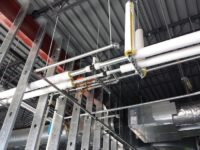
By Aaron Stotko When a century-old Dallas railroad company headquarters required major renovations to transform into a Homewood Suites by Hilton, initial cost estimates for the hydronic heating system came in too high. That’s when City Wide Mechanical of Dallas looked to alternative piping systems for a solution. They found PEX-a pipe with F1960 expansion Read more
By Aaron Stotko
When a century-old Dallas railroad company headquarters required major renovations to transform into a Homewood Suites by Hilton, initial cost estimates for the hydronic heating system came in too high.
That’s when City Wide Mechanical of Dallas looked to alternative piping systems for a solution. They found PEX-a pipe with F1960 expansion connections to be the ideal system, due to its durability and ease of installation in addition to the job-site productivity, safety and, best of all, profitability potential it provided.
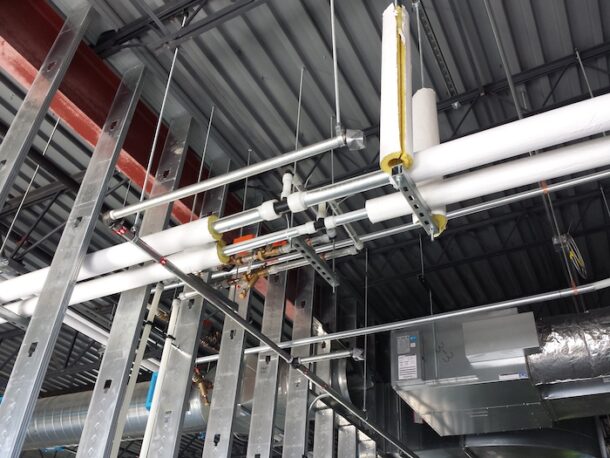
And City Wide Mechanical isn’t alone in their findings. Many mechanical contractors are discovering the benefits of PEX-a pipe and F1960 connections as the preferred alternative to copper, iron, and steel, which have dominated the mechanical piping industry for decades.
Benefits of PEX-a
PEX is an acronym for crosslinked polyethylene. It has been used in North America since the mid-1980s, starting with radiant floor heating systems, then moving into plumbing and, eventually, to hydronic hot-water heating and chilled-water applications.
PEX can be manufactured via three different processes, which create products with varying crosslinking percentages that allow for different characteristics. PEX-a is the most durable, flexible, and resilient with crosslinking around 85%. PEX-b is a stiffer piping product with crosslinking around 65% to 70%, and PEX-c features crosslinking around 70% to 75%.
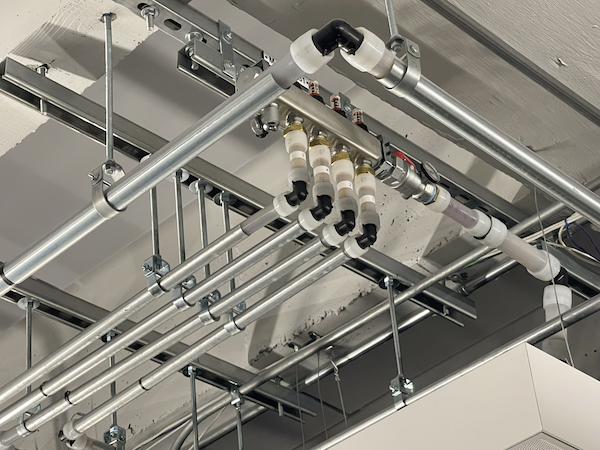
ASHRAE Headquarters Grand Opening Fall 2021, photos by Devin Abellon
One major benefit of the higher crosslinking in PEX-a is its extreme flexibility along with its thermal and shape memory. The flexibility of PEX-a eliminates most connections in smaller-diameter piping, saving time and money with up to half the connections required in rigid metal piping systems. To make a change in direction, the installer simply bends the pipe instead of having to stop and make a fitting. There are also bend supports available that help hold a bend securely in place.
The thermal memory of PEX-a provides kink repairability with a simple shot of heat from a heat gun. This eliminates the need to add in a coupling if a kink ever occurs in the pipe. (It is important to note that kink repairability is not possible with PEX-b or PEX-c pipe.)
The shape memory of PEX-a allows the pipe to expand and contract back down to its original shape. This makes it extremely resilient in freezing conditions and also provides for the fastest, easiest, most reliable PEX-a fitting system — F1960 expansions.
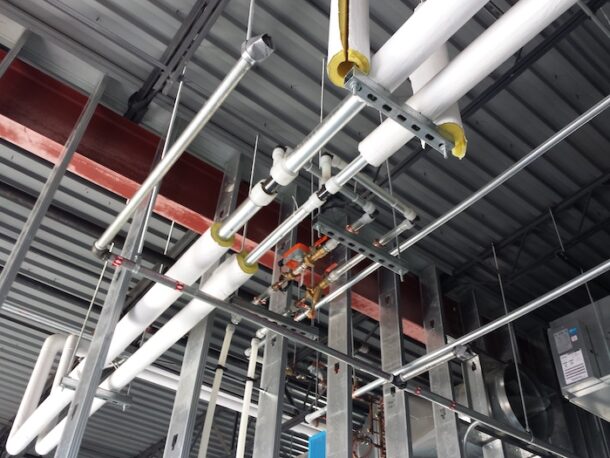
Expansion fittings require one simple tool to expand the pipe and an expansion ring before inserting a fitting. As the pipe and expansion ring naturally shrink back to their original shape, it creates a strong, durable connection that holds tight and can never be dry-fit. (Note: It is not recommended to expand PEX-b or PEX-c pipe due to microcracking that can occur.)
The innovative expansion fitting method eliminates torches, glues, and solder from a job site for greater worker safety. Plus, the system is extremely easy for installers to learn, helping get new crews up to speed quickly.
Speaking of job-site safety, PEX is also much lighter in weight compared with metal systems. For example, a 300-foot coil of 1/2-inch PEX weighs about 18 pounds, whereas the same amount of copper pipe weighs around 85 pounds. The lighter weight of PEX makes it safer and easier for installers to move around a job site and also eliminates the need for heavy-lifting equipment.
PEX-a also has a long-term advantage over copper when it comes to performance longevity. It is a static system, meaning its internal surfaces — which are three times smoother than copper — will not pit, scale, or corrode. That means its performance will remain the same from day one through decades of use.
Finally, because it is not a traded commodity, PEX-a holds a relatively stable material cost. This makes bidding a project much more consistent and reliable.
Application Details and Installation Tips
PEX-a is regulated by the ASTM F876 standard, which denotes temperature and pressure ratings of 200°F at 80 psi (pounds per square inch), 180°F at 100 psi, and 73.4°F at 160 psi. These values are well within the range of operation for most hydronic systems, including chilled beams, fan coil units, baseboards, radiators, hydronic VAV (variable-air volume) reheat coils, and radiant manifolds.
Because PEX is oxygen-permeable, it is important to use a pipe with an oxygen barrier that limits oxygen diffusion to levels below DIN 4726. This will protect the metallic components in the mechanical piping system, such as valves, strainers, and pump volutes, from corrosion.
The pipe is manufactured in sizes from 5/16 inch up to 4 inches and features a copper tube size (CTS) outside diameter. This means all the off-the-shelf components used in a copper hydronic piping system — hangers, supports, and insulation — can be the same.
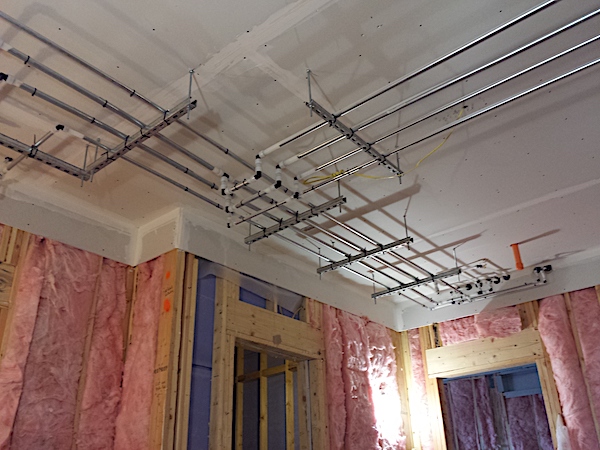
For horizontal piping, the industry offers PEX-a Pipe Support — a galvanized-steel channel that is 9 feet in length and available in PEX pipe sizes from ½ inch to 3½ inches. This solution enables hanger spacing similar to copper pipe and helps control the natural expansion and contraction of the pipe as it heats and cools.
Because PEX-a expands at 1.1 inches per 100 feet per 10°F Delta T (which is 10 times that of copper), installing anchors every 65 feet and using PEX-a Pipe Supports allows PEX-a to function much like a copper system. In fact, different installation methods have a different effect on the overall net expansion rate.
With a strut-and-clamp system, using PEX-a Pipe Supports and anchoring with fixed points reduces the expansion rate of PEX-a to 0.08 inches per 100 feet per 10°F Delta T (a rate less than copper). And a loop-and-clevis system can reduce the rate to 0.12 inches per 100 feet per 10°F Delta T.
If you’d like to learn more about PEX-a piping systems, visit the Plastics Pipe Institute at plasticpipe.org or the Plastic Pipe and Fittings Association at ppfahome.org.
 Aaron Stotko is the director of Segment Marketing at Uponor. He can be reached at aaron.stotko@uponor.com.
Aaron Stotko is the director of Segment Marketing at Uponor. He can be reached at aaron.stotko@uponor.com.

Scholarships awarded to children, grandchildren and employees of Carrier and Bryant distributors and contractors nationwide Carrier and Bryant have announced the recipients of this year’s Carrier & Bryant Distributors’ Education Foundation scholarships. Recipients will receive funding for their post-secondary or vocational program during the 2022-2023 school year. Carrier and Bryant are part of Carrier Global Corporation (NYSE: CARR), the leading global provider Read more
Scholarships awarded to children, grandchildren and employees of Carrier and Bryant distributors and contractors nationwide
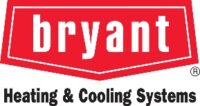 Carrier and Bryant have announced the recipients of this year’s Carrier & Bryant Distributors’ Education Foundation scholarships. Recipients will receive funding for their post-secondary or vocational program during the 2022-2023 school year. Carrier and Bryant are part of Carrier Global Corporation (NYSE: CARR), the leading global provider of healthy, safe, sustainable and intelligent building and cold chain solutions.
Carrier and Bryant have announced the recipients of this year’s Carrier & Bryant Distributors’ Education Foundation scholarships. Recipients will receive funding for their post-secondary or vocational program during the 2022-2023 school year. Carrier and Bryant are part of Carrier Global Corporation (NYSE: CARR), the leading global provider of healthy, safe, sustainable and intelligent building and cold chain solutions.
Established in 1981 the Carrier & Bryant Distributors’ Education Foundation was created to commemorate the late William A. Blees for his many years of service as an advisor to Carrier and Bryant distributors. Since inception, the foundation has awarded scholarships to over 400 students. Today, the foundation continues to serve the children, grandchildren and employees of distributors and contractors while also honoring the industry’s founder, Willis Carrier.
Willis Carrier attended Cornell University on a full, four-year merit scholarship. He earned a bachelor’s degree in electrical engineering, became a successful inventor and businessperson, and, in 1902, invented the founding principles of modern air conditioning. Willis Carrier was a consummate scientist and an educator who attended college on scholarship, just as our recipients will in his honor.
 “The Carrier & Bryant Distributors’ Education Foundation scholarships are a special way for us to say ‘thank you’ to our contractors and distributors for their expertise and support,” said Justin Keppy, President, NA Residential & Light Commercial HVAC, Carrier. “This year’s outstanding scholarship recipients embody all of the values and characteristics we look for in future leaders, and we’re proud to support their educational endeavors just as Willis Carrier was supported in his.”
“The Carrier & Bryant Distributors’ Education Foundation scholarships are a special way for us to say ‘thank you’ to our contractors and distributors for their expertise and support,” said Justin Keppy, President, NA Residential & Light Commercial HVAC, Carrier. “This year’s outstanding scholarship recipients embody all of the values and characteristics we look for in future leaders, and we’re proud to support their educational endeavors just as Willis Carrier was supported in his.”
Scholarships from the foundation are available to children, grandchildren and employees of Carrier and Bryant distributors and contractors and their employees throughout the U.S. Students are awarded the scholarship based on academic achievement, extracurricular activities, demonstrated leadership potential, and personal motivation. A short essay about the candidates’ educational and career aspirations is required during the application process. There were 119 total applicants from 27 states for this year’s scholarships.
The 2022 Carrier & Bryant Distributors’ Education Foundation scholarship recipients include:
| Jordan Acuna | San Marcos, CA |
| Jacob Baker | Monroe, NC |
| Joshua Bedwell | Candler, NC |
| Hallei Bittlinger | Hebron, KY |
| Yvette Castaneda | Mission Viejo, CA |
| Lillian Cleaves | Lima, OH |
| Audry DeSantis | Springfield, OH |
| Domiy DiTomasso | Hahira, GA |
| Mary Drinkard | Rome, GA |
| Gary Faulks | Stamford, TX |
| Eva Griffin | Springfield, IL |
| Derek Helsten | New London, WI |
| Mary Kulis | Kent, OH |
| Anne Leaman | Willow Street, PA |
| Addyson Lingafelter | Griffin, IN |
| Shayna Lloyd | Eden, NC |
| Camden Meadows | Cartersville, GA |
| Josiah Paul | Stoutsville, OH |
| Rachel Rawlings | Chillicothe, OH |
| Myora Slaughter | Blue Springs, MO |
| Rachel Strausman | Moorpark, CA |
| Cheyanne Wandrey | Boone, IA |
For more information about Carrier or Bryant, please visit https://www.carrier.com/residential/en/us/ or www.bryant.com.

Name: Matthew Fleming Title: Owner Company: All-Star Plumbing & Heating Location: Manasquan, New Jersey Specialty: New Construction Large Custom Homes Although a self-described “rough around the edges” kind of guy, Matthew Fleming (@allstarplumbinginc), owner of All-Star Plumbing & Heating, Manasquan, N.J., admits he’s a girl dad, and he wouldn’t have it any other way. “I Read more
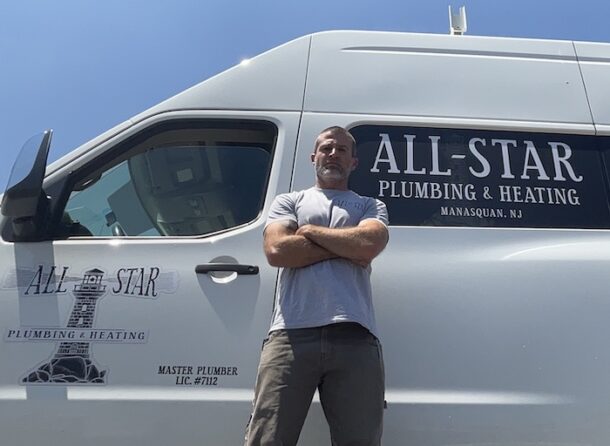 Name: Matthew Fleming
Name: Matthew Fleming
Title: Owner
Company: All-Star Plumbing & Heating
Location: Manasquan, New Jersey
Specialty: New Construction Large Custom Homes
Although a self-described “rough around the edges” kind of guy, Matthew Fleming (@allstarplumbinginc), owner of All-Star Plumbing & Heating, Manasquan, N.J., admits he’s a girl dad, and he wouldn’t have it any other way. “I have no problems laying on the floor and playing dolls with my daughters,” says Fleming. He says that at some point you have to be able to shut OFF work and turn ON home.
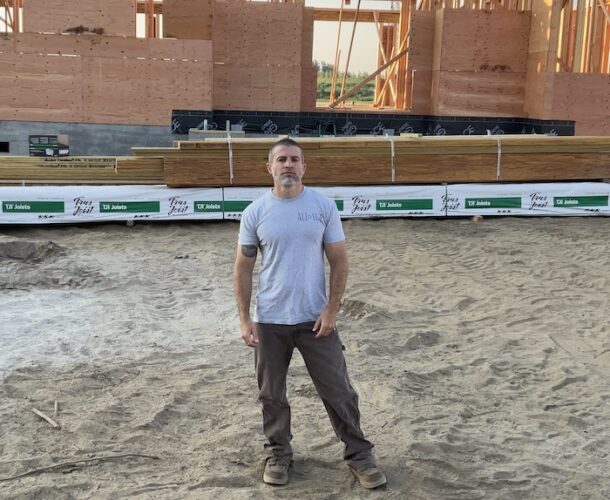
And while spare time doesn’t happen as often as Fleming would like, when it does, he loves hanging at the beach with his wife and kids. He also tries to make time to work out at the gym every morning to clear his head and start the day right. “Work will always be there tomorrow so you need to make sure that you’re not missing those important life/leisure moments that you can’t get back.”
It’s a Generational Thing
With Fleming’s father owning a family plumbing business, it was a simple decision to get into the plumbing industry. Fleming went to college for business administration and construction management to at least give himself a solid base of business knowledge if he was to ever take over the company. A solid decision as it turns out. “I started plumbing when I was about 16 years old but would always help out my dad as a kid. I worked part time through school and college. Once I graduated college, I jumped in full time and I’ve never looked back,” says Fleming.

The Ultimate Influence
Fleming has recently officially taken over the company that his father started 30+ years ago. And it was his father that molded Fleming into the craftsman that he is today. “He instilled in me the values of hard work and determination,” says Fleming. “He was always pushing the envelope and would take on jobs that other plumbers and companies would shy away from. My father always embraced challenges, and after years of doing that, it became clear the you can attack difficult situations with the confidence and mindset that you have what it takes to handle it.”
 Like most modest tradespeople, Fleming doesn’t consider himself a “role model” but he does feel like he has some valuable bits of advice he could pass on to the younger generation looking to get into this trade or take into whatever field they choose. “A lot of plumbing is having the ability to problem solve, and that applies to any field. I encourage people to never be content with their current knowledge and skill set, you can always find ways to improve,” says Fleming.
Like most modest tradespeople, Fleming doesn’t consider himself a “role model” but he does feel like he has some valuable bits of advice he could pass on to the younger generation looking to get into this trade or take into whatever field they choose. “A lot of plumbing is having the ability to problem solve, and that applies to any field. I encourage people to never be content with their current knowledge and skill set, you can always find ways to improve,” says Fleming.
These days a lot of teaching and connecting with others happens through social influencing. “Social media has absolutely made a big impact on my business for multiple reasons. I’ve learned so much from so many of the incredible plumbers across the country and have made some good friends, too. I’ve gotten jobs from the work people have seen on my Instagram, but above that, seeing the amazing work that others put out makes me improve my own work. I always remind the guys that I might take a picture of their work and post it to Instagram for public ridicule by the “super plumbers,” so make sure it’s right, haha,” says Fleming. “Social media can be very valuable if you use it right, and the plumbing community is second to none on there.”
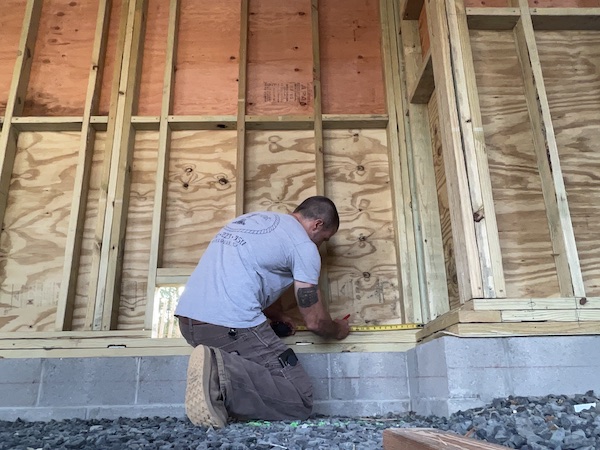
State of the Industry
“I feel like most people believe that being in the trades means that you’re a second-rate citizen and couldn’t get a “real” job,” says Flaming. When in reality, continues Fleming, it’s a respectable occupation that requires highly educated, hard-working people. And with that comes training. “There should be more educational and training options available so that people entering the trades can be trained properly, which will help raise industry standards. Increasing trade school funding to ensure that the programs available are legit programs would absolutely attract more people. They need to be proactive in recruiting instead of just waiting for kids to show up,” says Fleming.
A Hard Day’s Work
One of the most rewarding things about his work is the problem-solving aspect. “I really enjoy when the customer tells me that they had four other companies there prior and nobody could figure out the problem but we did,” says Fleming. I’d say that’s a win.
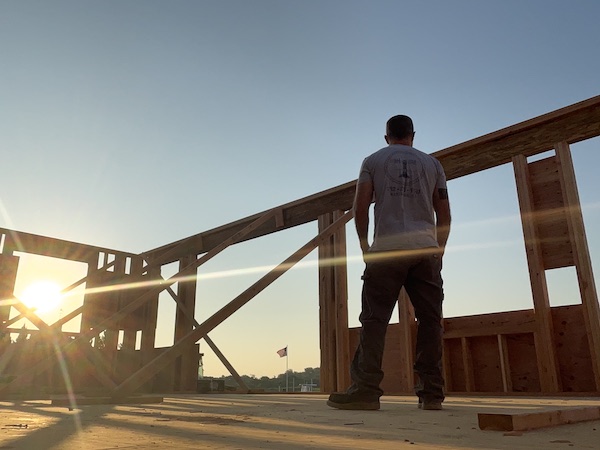 But nothing compares to when you are down and come home to see those smiling faces. “I was having a pretty rough week, put through the ringer. I came home that day feeling pretty defeated only to be greeted by my two daughters—ages 6 and 8—barreling towards me to give me a huge hug as my wife kissed me on the cheek. Instantly, I was reminded of what is really important, and even though I was having a rough patch, I was still doing a good job. It was just what I needed and I thought to myself, ‘I’m extremely lucky to have this life that plumbing has provided me.’”
But nothing compares to when you are down and come home to see those smiling faces. “I was having a pretty rough week, put through the ringer. I came home that day feeling pretty defeated only to be greeted by my two daughters—ages 6 and 8—barreling towards me to give me a huge hug as my wife kissed me on the cheek. Instantly, I was reminded of what is really important, and even though I was having a rough patch, I was still doing a good job. It was just what I needed and I thought to myself, ‘I’m extremely lucky to have this life that plumbing has provided me.’”

 Guest Author
Guest Author